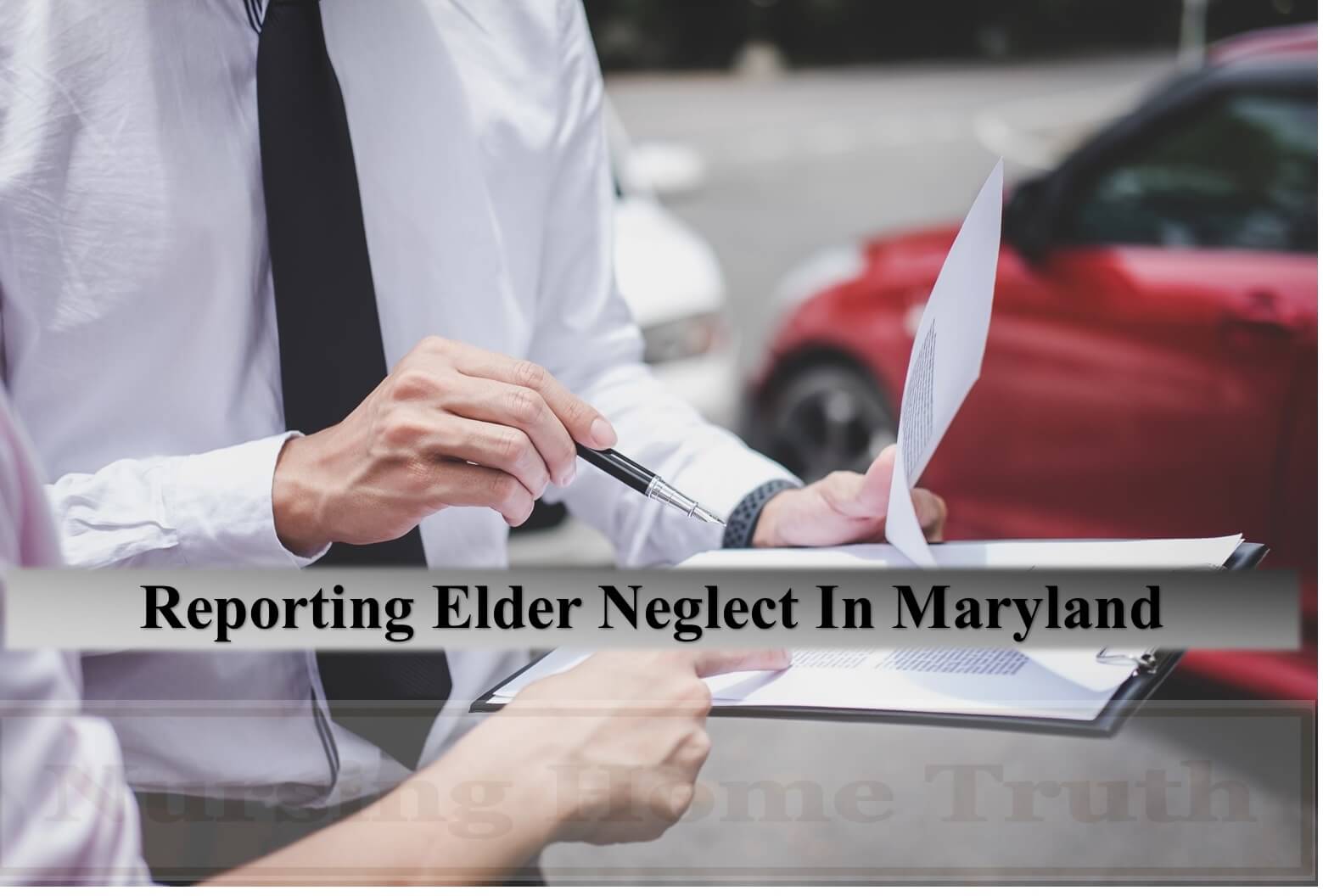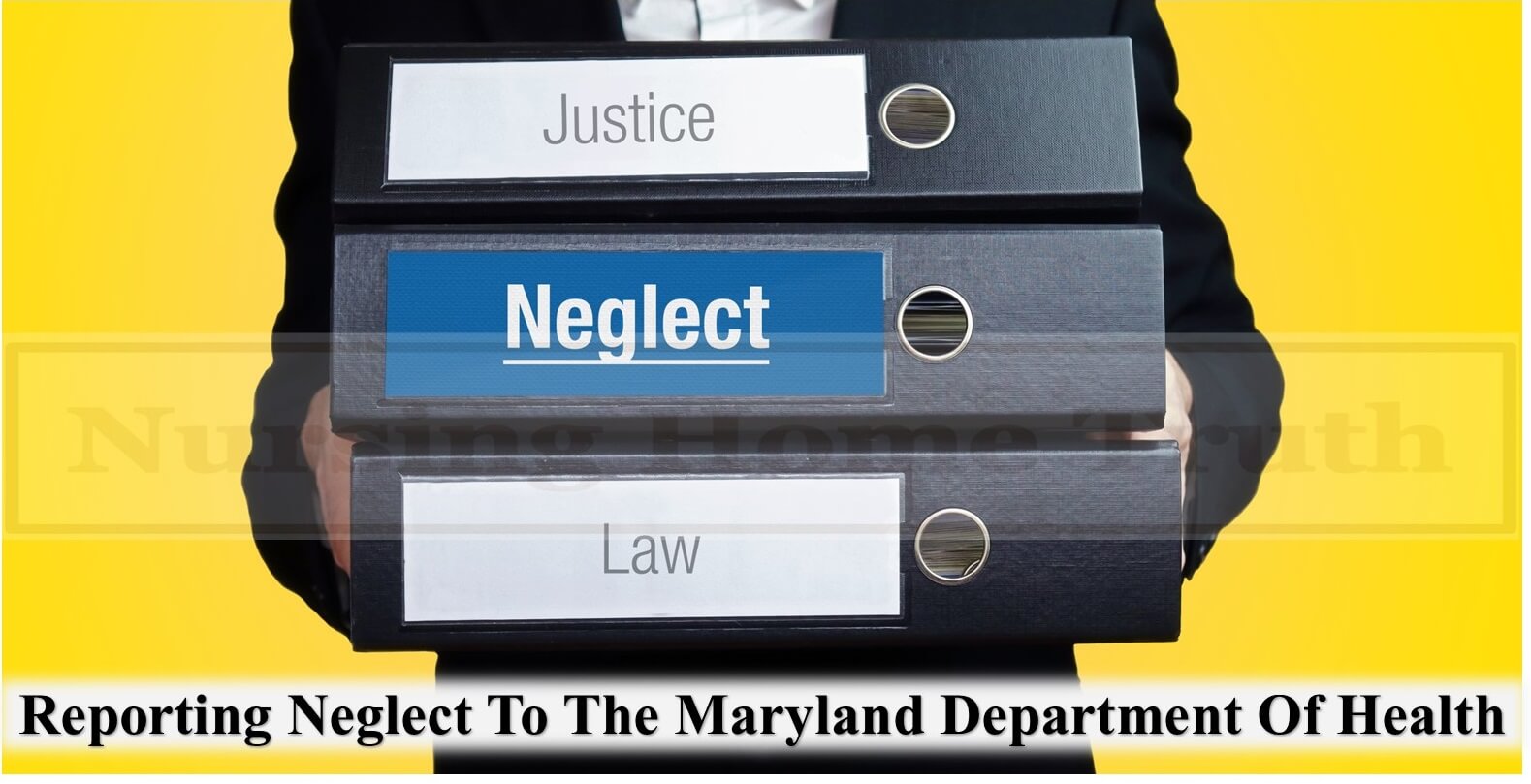Article Updated: April 6, 2022
How to Report Nursing Home Neglect in Maryland
My legal practice focuses on suing bad nursing homes. Often, I get calls from concerned family who, in addition to wanting to pursue a lawsuit, want to report the abuse of their loved one to the proper agencies.
If you’re in that category, this article is for you. Below, you will learn the key governmental and agency resources available for you to report nursing and elder abuse in Maryland.
If, in addition to administrative relief, you want to hold the bad nursing home legally accountable and make them pay for the harm they caused your family, call me for a free consultation. My contact information is at the bottom of this page.
Clickable Table of Contents
Reporting Elder Abuse in Maryland
1 – What Is Elder Neglect?
2 – How To Spot Elder Neglect
3 – Nursing Home Neglect in Maryland
4 – What To Do When You Suspect Nursing Home Neglect
5 – Reporting Elder Neglect In Maryland
6 – Reporting Nursing Home Neglect To An Ombudsman
7 – Reporting Neglect To The Maryland Department Of Health
Resources
8 – Nursing Home Neglect May Warrant A Lawsuit- Contact Us Today
9 – Supporting Literature, Citations & Research
10 – About the Author
11 – Legal Help in Maryland & Nationally
What Is Elder Neglect?
Elder neglect in the state of Maryland according to the Maryland Department of Health is when a caregiver fails to meet the needs of an elderly individual or fails to respond to what they require to be safe and comfortable.
For the state of Maryland this can mean a number of things such as failing to provide:
◊ Food
◊ Water
◊ Shelter
◊ Medicine
◊ Clothing
◊ Personal hygiene care
Nursing homes have a big responsibility for the well-being and health of every single resident that resides in their facilities, however, very often, nursing homes fail in this regard and neglect the basic needs of those who rely on them.
How To Spot Elder Neglect
If you have a loved one in a nursing home you should always be keeping an eye out for neglect. Researchers have found that nursing homes have a higher rates of neglect and abuse per resident than other forms of assisted living for the elderly which is worrying.
So what should you look for in a nursing home resident to assess if they are being neglected?
Some of the easiest signs to look for are physical ones:
◊ Weight loss that is not explainable
◊ Dehydration
◊ Injuries like bruises and cuts
◊ Sores on the body
◊ Unsanitary living conditions
◊ Torn and unkept clothes
◊ Poor Hygiene
Not all signs of neglect in a nursing home are easy to spot like emotional ones and behavioral ones. To spot these you need to take note of changes you observe like an increased level of fear or anxiety, strange sleeping patterns or your loved one acting withdrawn.
Nursing Home Neglect in Maryland
Nursing home neglect in the state of Maryland can be handled by and reported to a number of entities.
The Adult protective services is one agency that can investigate abuse and neglect in a nursing home setting, and an ombudsman can help those in long-term care facilities by acting as an independent advocate that can help you protect the rights of your loved one.
In Maryland, the long-term care (LTC) ombudsman program has been created to help ensure that anyone can contact them anytime with complaints of neglect for not only immediate family but for other residents you believe are being neglected as well as friends.
These resources are important as the Maryland law for assisted living regulations has not been updated since 2008, which means that it is now 5 years out of date since the law requires that the regulations be updated every 8 years.
Neglect is also highly probable in Maryland nursing homes because the current rules have no licensing requirements for direct care aides, no limits for how many residents are cared for by one RN, and does not require that medical technicians are always on hand in the nursing home.
This lack of limits on how many residents are under one RN often means residents are not seen as frequently as they need to be seen, and the lack of round the clock medical technicians means that medications are given late.
What To Do When You Suspect Nursing Home Neglect
At anytime if you are concerned that a person is being neglected in a nursing home you should reach out to one of the many available agencies in the state of Maryland that can offer you help and guidance.

If you are under enough concern of neglect to the point that you believe a nursing home resident is going to get assaulted, you can and should dial 911 to get the police involved immediately.
If the situation is not so serious that you believe assault or abuse is imminent and that it is more of a prolonged neglect situation, you can
Report the incident through the Maryland Office of Health Care Quality (OHCQ) or the Maryland LTC ombudsman.
If you believe that the neglect is financial then you can also involve the adult protective services who investigate financial abuse and neglect.
Complaints to these entities can be made online or over the phone at any time. If the person who is being neglected is on Medicaid then a complaint can also be made to the Maryland Attorney General’s Office, Medicaid Fraud Control Unit (MFCU).
Reporting Elder Neglect In Maryland
By reporting nursing home neglect in Maryland you are starting a ball rolling which can help stop the neglect that a vulnerable individual is facing.
Knowing how to report nursing home neglect in Maryland and get this ball rolling is very important. In order to file a complaint against a specific individual or entity you can fill out a complain form online or mail a complaint form into the board.
Once the board receives this complaint it is taken very seriously and you may be contacted for additional information in the investigation.
Every complaints is reviewed immediately and you will receive a letter letting you know that the complaint has been received and is being reviewed.
Sometimes the complaint is referred to another agency than the one you filed with because they believe it will be better dealt with in another office.
When the board believes that a violation may have happened the complaint will likely get sent next to the board’s own investigators to gather evidence and conduct interviews.
Once there has been a conclusion to the case the board will decide what actions or penalties they should take against the nursing home which can include
◊ Reprimand
◊ Suspension or revocation of a license
◊ Monetary fine
◊ Probation
During this process witnesses may be subpoenaed and people will likely be asked to testify as well.
Reporting Nursing Home Neglect To An Ombudsman
Often people are not sure how to report nursing home neglect in Maryland and one great tool at your disposal is the office of the ombudsman.
Even more confusing for many is that they may have never heard the term ombudsman and are not sure what this term means, or what role they fulfill in their daily job functions.
What Is An Ombudsman
An ombudsman is an official working within a government capacity who is appointed in their job to investigate complaints against maladministration.
This position when used within the scope of a nursing home is known as a long-term care ombudsman.
This is an independent advocate who helps anyone who needs help, guidance and information on problem resolutions like neglect in nursing home settings.
An ombudsman is an advocate and what you say to them can remain private and confidential.
The LTC ombudsman therefore helps more than anything to advocate for nursing home residents by providing them with information on quality of care and problem resolution and filing complaints.
How Can An Ombudsman Help?
Ultimately, ombudsmen are a great tool for reporting elder abuse in Maryland but what can the ombudsmen do exactly?
One of the main tasks of this role is to help educate residents and family on issues related to long term care and help individuals feel empowered to make the best choices for themselves.
The ombudsmen also helps you as a resident know your rights, and for your family to know what standard of care is normal and acceptable.
If you have a complain the ombudsmen can also help you to know where to look to file a complaint and help you better understand your rights.
An ombudsmen gives consultations to make recommendations for protecting the rights of residents so that their quality of life is high and they work hard to address concerns and complaints related to neglect.
Ombudsman Contact For Allegany County
301-783-1771
Ombudsman Contact For Anne Arundel County
410-222-4257
Ombudsman Contact For Baltimore County
410-887-4200
Ombudsman Contact For Calvert County
410-535-4606
Ombudsman Contact For Caroline County
410-778-6000
Ombudsman Contact For Carroll County
410-386-3810
Ombudsman Contact For Cecil County
410-996-8429
Ombudsman Contact For Charles County
301-934-0109
Ombudsman Contact For Dorchester County
410-742-0505
Ombudsman Contact For Frederick County
301-600-2877
Ombudsman Contact For Garrett County
301-334-9431
Ombudsman Contact For Harford County
410-638-3025
Ombudsman Contact For Howard County
410-313-6423
Ombudsman Contact For Kent County
410-778-6000
Ombudsman Contact For Montgomery County
240-777-3369
Ombudsman Contact For Prince George’s County
301-265-8483
Ombudsman Contact For Queen Anne’s County
410-758-0848
Ombudsman Contact For Somerset County
410-742-0505
Ombudsman Contact For St. Mary’s County
301-475-4200
Ombudsman Contact For Talbot County
410-778-6000
Ombudsman Contact For Washington County
301-790-0275
Ombudsman Contact For Wicomico County
410-742-0505
Ombudsman Contact For Worcester County
410-742-0505
Reporting Neglect To The Maryland Department Of Health
Another agency that you can appeal to for help is the Maryland Department of Health itself.
Reporting to the Maryland Department of Health via the Office of Health Care Quality is a good option if you want a clear and direct process to get started when you believe neglect has taken place.
While knowing how to how to report nursing home neglect in Maryland can be difficult, this office has made the process easier with online tools that give you copies of all forms that need to be filled out.
These forms are for purpose of reporting elder abuse in Maryland and if they seem difficult to complete you can contact an ombudsman for help with answers, or you can get the help of an attorney.
You can contact this office for help as well by phone at 443-826-0364.
Nursing Home Neglect May Warrant A Lawsuit- Contact Us Today
If you still are not sure how to report nursing home neglect in Maryland or you feel overwhelmed you can also contact an attorney for help navigating the process.
Additionally, if you have identified neglect it may be a form of neglect that warrants a lawsuit where you can recover damages from the facility and its agents for failing in their duty to provide safe care for your loved one.
Warmly,
Reza Davani, Esq.
State Bar No.: 1212110211
Federal Bar No.: 30168

Supporting Literature, Citations & Resources:
Magruder, K. J., Fields, N. L., & Xu, L. (2019). Abuse, neglect and exploitation in assisted living: an examination of long-term care ombudsman complaint data. Journal of elder abuse & neglect, 31(3), 209-224.
Maryland Long-Term Care Ombudsman Office Contact Information Page
Snyder, J., & Benson, W. F. (2017). Adult protective services and the long-term care ombudsman program. In Elder abuse (pp. 317-342). Springer, Cham.
Maryland Office of Health Care Quality.
Maryland Department of Health
Maryland Government Elder Abuse Prevention
About the Author
This nursing home and medical malpractice article was written by Baltimore, Maryland nursing home attorney Reza Davani, Esquire. Mr. Davani received his Juris Doctor degree from a Tier 1 law school, the University of Maryland Francs King Carey School of Law. He received his first license to practice law from the State of Maryland’s Court of Appeals (MD State License No. 1212110211), and just four months later received a federal law license from the United States District Court for the District of Maryland (Federal License No. 30168).
Mr. Davani has been practicing law for over 10 years. He began practicing law by helping clients as a sanctioned student lawyer before receiving his law license, and second chaired his first jury trial in federal court before even graduating law school. He is a registered member of the Maryland Association for Justice (MAJ), the American Bar Association (ABA), the American Association for Justice (AAJ), and was formerly on the MAJ’s Legislative Leader’s Circle.
Mr. Davani has taken over 20 cases to trial in state and federal court, and favorably settled well over 100 cases for injured victims. He has personally helped his clients recover over $15,000,000 in personal injury, medical malpractice, and nursing home abuse settlements and verdicts in Maryland and other states. He is dedicated to fighting for justice, and welcomes the opportunity to help you.
Nursing Home Neglect Lawyer Near You in Baltimore, Maryland & Beyond
I can help you anywhere in Maryland, including Allegany County, Anne Arundel County, Baltimore City, Baltimore County, Carroll County, Calvert County, Caroline County, Cecil County, Charles County, Dorchester County, Frederick County, Garrett County, Harford County, Howard County, Kent County, Montgomery County, Prince George’s County, Queen Anne’s County, Somerset County, St. Mary’s County, Talbot County, Washington County, Wicomico County, and Worcester County.
I have helped clients in over a dozen jurisdictions, including California, Delaware, District of Columbia, Georgia, Illinois, Iowa, Massachusetts, Maryland, Mississippi, New Jersey, New Mexico, New York, North Carolina, Pennsylvania, South Carolina, Washington, and Virginia.
I help injured victims nationwide in all 50 states on a case-by-case basis via Pro Hac Vice.





